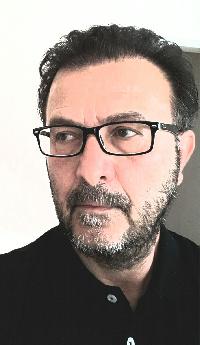| Halaman dalam topik: [1 2] > |
Pronunciation of the "i" without the dot in Turkish Penyiaran jaluran : jacana54 (X)
|
|---|
jacana54 (X) 
Uruguay
Bahasa Inggeris hingga Bahasa Sepanyol
+ ...
Hi,
In the past couple of weeks I've come across names of places in Turkey that have a letter "i" without the dot.
e.g.: Diyarbakır, Derepazarı
Can anyone please tell me more about this letter (particularly the pronunciation and how it differs from the "i" with the dot?)
As usually happens with new or surprising words, they came up in two completely different situations but one immediately after the other!
Moderators: please fee... See more Hi,
In the past couple of weeks I've come across names of places in Turkey that have a letter "i" without the dot.
e.g.: Diyarbakır, Derepazarı
Can anyone please tell me more about this letter (particularly the pronunciation and how it differs from the "i" with the dot?)
As usually happens with new or surprising words, they came up in two completely different situations but one immediately after the other!
Moderators: please feel free to move this posting to the most appropriate forum.
Thanks and enjoy your weekend.
 ▲ Collapse
| | | |
David Wright 
Austria
Local time: 10:44
Bahasa Jerman hingga Bahasa Inggeris
+ ...
it's a bit like the schwa, or the sound in "er" (the indication of hesitation, not teh German male pronoun).
| | | |
Dagdelen 
Turki
Local time: 11:44
Ahli (2010)
Bahasa Jerman hingga Bahasa Turki
+ ...
David Wright wrote:
it's a bit like the schwa, or the sound in "er" (the indication of hesitation, not teh German male pronoun).
No, I'm not agreeing with it.
Our "ı" should be pronounced like in:
"the" but without ti-eyç.
Just pronounce it like an "i" but without dot,
Even 2 year old childreen can do it here!
| | | |
Nesrin 
United Kingdom
Local time: 09:44
Bahasa Inggeris hingga Bahasa Arab
+ ...
| A video is worth a thousand explanations | Nov 13, 2010 |
Rasim Dağdelen wrote:
Just pronounce it like an "i" but without dot,
 
Hi Lucia,
I'm not Turkish so I won't try to explain, even though I've heard it pronounced a lot of times..
But this video may be helpful - skip to minute 3:40:
http://www.youtube.com/watch?v=H-l-x478FdU
I hope Turkish colleagues will find it accurate.
| | |
|
|
|
jacana54 (X) 
Uruguay
Bahasa Inggeris hingga Bahasa Sepanyol
+ ...
TOPIC STARTER
Rasim Dağdelen wrote:
Just pronounce it like an "i" but without dot,
Even 2 year old children can do it here! 
 Brilliant, Rasim... It turns out that I can do it too... and a very rejuvenating experience, if I may say so! Brilliant, Rasim... It turns out that I can do it too... and a very rejuvenating experience, if I may say so!
Thanks, Nesrin, that video was just what I needed! To me it sounds like the French "e" when it has no accents, or the "e" sound in "the", as Rasim says.
You've all made my day, thanks!
| | | |
Aude Sylvain 
Perancis
Local time: 10:44
Bahasa Inggeris hingga Bahasa Perancis
+ ...
| forvo.com - pronunciation by natives | Nov 13, 2010 |
Hello,
I came across that (collaborative) website recently, which contains pronunciations of words by native speakers.
I can't speak Turkish at all, but the few French and English entries I checked were correct and you can see where the speakers are located (e.g. AE/BE).
http://www.forvo.com/search/Diyarbakır/
[Edited at 2010-11-13 18:36 GMT]
| | | |
David Wright 
Austria
Local time: 10:44
Bahasa Jerman hingga Bahasa Inggeris
+ ...
| Exactly, schwa . | Nov 13, 2010 |
"No, I'm not agreeing with it.
Our "ı" should be pronounced like in:
"the" but without ti-eyç."
That's precisely the same sound. the "e" of the.
[Edited at 2010-11-13 19:08 GMT]
[Edited at 2010-11-13 19:09 GMT]
| | | |
Dagdelen 
Turki
Local time: 11:44
Ahli (2010)
Bahasa Jerman hingga Bahasa Turki
+ ...
David Wright wrote:
.....
Exactly, schwa .
That's precisely the same sound. ......
No, never! Let's write the word "Schwaben" in Turkish way: "şvabın"
So, you're not allowed to put a "ı" between "ş" and v"! U pronounce them (ş&v) very closely in German. Otherwise it won't sound German. That's why I'm disagreeing with it.
But if U want U can put your beloved "ı" between "b" & "n"
Cheers
[Edited at 2010-11-14 06:48 GMT]
| | |
|
|
|
| Schwa is the name of a phonetic sound | Nov 13, 2010 |
Rasim Dağdelen wrote:
David Wright wrote:
.....
Exactly, schwa .
That's precisely the same sound. ......
No, never! Let's write the word "Schwaben" in Turkish way: "şvabın"
So, you're not allowed to put a "ı" between "ş" and v"! U pronounce them (ş&v) very closely in German. Otherwise it won't sound German. That's why I'm disagreeing with it.
But if U want U can put your beloved "ı" between "b" & "n"  Check this
Check this
Cheers
Not the pronunciation. So yes, David is right.
Schwa indicates an unstressed vowel.
http://en.wikipedia.org/wiki/Schwa
| | | |
jacana54 (X) 
Uruguay
Bahasa Inggeris hingga Bahasa Sepanyol
+ ...
TOPIC STARTER | Symbol for unstressed vowels | Nov 14, 2010 |
Thanks, Madeleine, now I understand what David meant.
Great website, Aude! Very useful indeed.
And thanks for that "red" song, Rasim.

| | | |
| You can watch my video | Nov 14, 2010 |
Lucia Colombino wrote:
Hi,
In the past couple of weeks I've come across names of places in Turkey that have a letter "i" without the dot.
e.g.: Diyarbakır, Derepazarı
Can anyone please tell me more about this letter (particularly the pronunciation and how it differs from the "i" with the dot?)
As usually happens with new or surprising words, they came up in two completely different situations but one immediately after the other!
Moderators: please feel free to move this posting to the most appropriate forum.
Thanks and enjoy your weekend.

The video I prepared to this end will hopefully help you
http://www.youtube.com/watch?v=NPekeL4qlwI
The alphabet is phonetic as each letter retains its individual pronunciation at all times.Therefore once you learn the letters it is very easy to write whatever you hear and to read whatever is written. You do not have this opportunity in any other language.
| | | |
David Wright wrote:
"No, I'm not agreeing with it.
Our "ı" should be pronounced like in:
"the" but without ti-eyç."
That's precisely the same sound. the "e" of the.
[Edited at 2010-11-13 19:08 GMT]
[Edited at 2010-11-13 19:09 GMT]
I agree with you
like Schwarzanegger
| | |
|
|
|
LEXpert 
Amerika Syarikat
Local time: 03:44
Ahli (2008)
Bahasa Croatia hingga Bahasa Inggeris
+ ...
| Other phonetic languages... | Nov 15, 2010 |
İbrahim Tutuncuoglu wrote:
The alphabet is phonetic as each letter retains its individual pronunciation at all times.Therefore once you learn the letters it is very easy to write whatever you hear and to read whatever is written. You do not have this opportunity in any other language.
Turkish isn't the only phonetic language. One of mine, Croatian, immediately springs to mind as an example.
There must be others (although that discussion would get us OT pretty quickly...)
| | | |
Sara Freitas
Perancis
Local time: 10:44
Bahasa Perancis hingga Bahasa Inggeris
| Schwa is the best way for English speakers to learn this sound | Nov 15, 2010 |
I confirm (as a former Turkish learner)...pronouncing it like the schwa (unstressed vowel sound in English) is the best way for English speakers to get their mouths around this sound.
Nothing to do with Schwaben or Schwarzenegger
| | | |
jacana54 (X) 
Uruguay
Bahasa Inggeris hingga Bahasa Sepanyol
+ ...
TOPIC STARTER | A great video | Nov 15, 2010 |
Thanks!

| | | |
| Halaman dalam topik: [1 2] > |











